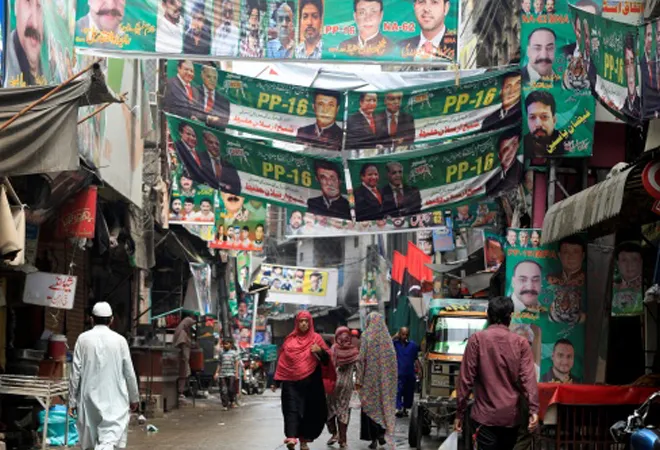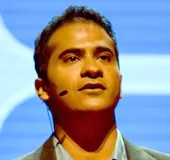 The ‘General’ Election
The ‘General’ Election seems to be the most cliched and contrived pun, yet it is the most obvious and apropos to Pakistan’s impending elections. It’s often said of Pakistan that while most states have an army, in the Islamic Republic, it is the army that has a state. You could wax lyrical with diplomats and government servants in Islamabad (the political capital), but decisions are firmly made in the garrison town of Rawalpindi (army headquarters).
For years, in Pakistan, it was said no matter who is charge, it is the military that is ultimately in charge. So much so, that one Pakistani journalist and documentary filmmaker described the scenario to me as such – “For us, we have two Prime Ministers”, referring to both former Prime Minister, Nawaz Sharif and the then army chief, Raheel Sharif. “The more important Sharif, he stated deals with foreign policy and defense issues, while token nominee Sharif, deals with economic, trade and domestic issues”. No prizes for guessing which Sharif held what portfolio and wielded the scepter.
Growing up in India, the diatribe and imbroglio of Indo-Pak diplomacy was my daily fiber at breakfast, it satiated my intellectual appetite for lunch and at dinner, the more I read the news, I would get ready to repeat the same cycle the next morning. Relations with Pakistan, was the classic one step forward but two steps back scenario. Even as a cricket aficionado, and later as a sports journalist, India-Pakistan cricket matches would get called off as tensions would reach a crescendo in the 1990s (pre-Kargil War) and later after the Mumbai terror attacks of 2008.
So naturally India, of all countries has a big stake in Pakistan’s elections; what happens in Pakistan percolates to India. But it’s not just India, that is carefully monitoring the election, China, Pakistan’s ‘all weather ally’ is tuned in.
Afghanistan, the epicenter of the US led war on terror has long felt it’s eastern neighbour has had a Janus-faced approach in backing Taliban insurgents on its home soil. And of course, the United States, which publicly is an ‘ally’ of Pakistan, but has long viewed Islamabad through the lens of an unfaithful perfidious partner in the war on terror. In some ways, it has been a ‘
with friends like these approach’ between Washington and Islamabad.
Pakistan is set to go to the ballot box on the 25
th of July. An almost seminal moment for a country that has spent a majority of its seventy years under military rule and has only twice transferred power from one civilian government to another.
The PAN-Islamic nation has been simmering with rising extremism and a moribund economy in financial dire-straits. So naturally elections would be the watershed moment to bring in a new messiah who can usher a new renaissance in its turbulent history.
However, there is a dementor like gloom hanging over the elections.
Media reports cite eminent journalists, human rights activists, election officials and some politicians being coerced by the Army.
The best way to think of the Pakistan elections is to think of a chaotic melee in a WWE ring with a Royal Rumble setting of various players trying overthrow the other out of the ring.
The Players:
Nawaz Sharif/Shehbaz Sharif and the PML-N
Going by wrestling entertainment parlance, the current ‘reigning champion’ or rather incumbent is the Pakistan Muslim League (PML-N) which was headed by former three-time Prime Minister Nawaz Sharif. However, there was no ‘
third time is a charm’ luck for Sharif, as he has never completed a single term in office. This is the second time he has been ousted out of office under charges of corruption, although this time he was given a lifetime ban by the Supreme Court and arrested on his return to Pakistan from London.
Sharif, however alleges, it was the nefarious hand of the army that wanted him out of power for his rapprochement towards India; largely seen as a no gone zone by the Pakistan army that thrives of the hostility towards its larger neighbour.
Sharif, is no stranger to incurring the army’s wrath, having been ousted from office (second stint) in 1999 under a bloodless coup engineered by the then military general and future President Pervez Musharraf.
PML-N officials allege military coercion and insinuate a rigged election by the army, where several of its party members have defected to a rival political party.
The reigns of the party are now held by the younger of the Sharif brothers, Shehbaz Sharif, former Chief Minister of Punjab – the most populous state and a PML-N stronghold.
My Name is Khan
Imran Khan & Pakistan Tehreek-e-Insaf (P.T.I)
Meet captain charismatic!
Imran Khan needed little introduction to the Pakistani electorate. Not because he was an active opposition member for years, but he was the country’s iconic cricket captain who won the World Cup for Pakistan in 1992.
His accolades on the field earned him the respect of the cricketing fraternity at home and abroad. Seen back then as the young debonair anti-corruption crusader, Mr. Khan has presented his party as the only viable alternative, to move away from kleptocratic corrupt dynastic politics of the PML-N and the Pakistan People’s Party (PPP).
Mr. Khan, who cuts a charismatic figure of Mr. Clean, is not without controversy in this election as his political rivals, particularly PML-N accuse him of having worked an under the table deal with the army, to win this election.
Mr. Khan is untested on the international arena and has faced criticism in the past for being soft on the Taliban and other extremist hardline groups.
The Pakistan cricket team has seen a number of its cricket players in the past accused of match-fixing (rigging the game), it would be cruelly ironic, if clean captain charismatic were found guilty of rigging an election.
Pakistan’s People’s Party (PPP):
If there is one party that has been at constant battle with the Pakistani military establishment, it would be the PPP.
The founder of the party, former Prime Minister, Zulfikar Ali Bhutto, was overthrown and controversially hanged by military dictator Zia-ul-Haq. His daughter, the enigmatic former Prime Minister, Benazir Bhutto was the first woman to lead the government of an Islamic country. She was ousted out of office twice and was brutally assassinated on her return to Pakistan in 2007.
As a result, the PPP won the sympathetic vote in the 2008 elections and stormed back into power restoring a somewhat democratic process, after a decade under military dictator Pervez Musharraf. However, Asif Ali Zardari, the widower of Benazir Bhutto was seen as corrupt and the PPP was seen as a weak and unscrupulous party.
Headed by Bilawal Bhutto Zardari, the son of late Benazir Bhutto, the party isn’t expected to upset the applecart, but is likely to help in coalition formation, given its stronghold base in the southern province of Sindh.
The Army:
The army presents itself as the strongest institution in charge, in a country rife with corrupt politicians and squalid leaders besmirched in scandals. The army is seen as the epitome of piety, almost pure as the driven snow.
There have been four army generals that have governed Pakistan for most of its existence (Ayub Khan, Yahya Khan, Zia-ul-Haq & Pervez Musharraf). While even during civilian reign, the army is firmly in charge of foreign policy overtures and needless to say defense is firmly within the army’s purview. Ironically, some analysts point to the fact under military rule, there have been more propitious periods in relations with India and a more robust economic outlook.
Going back to the wrestling analogy, the army is sort of the actor that is sitting on the sidelines of the ring, watching the participants pound each other. When the time is right, and the referee (election commission perhaps) is not looking, it will slip in that steel chair to its preferred participant, to whack its opponent over the head, and thereby influence the outcome.
As Pakistanis go to the polls, geopolitical analysts wonder, will it be a general election or the election of the generals?
The views expressed above belong to the author(s). ORF research and analyses now available on Telegram! Click here to access our curated content — blogs, longforms and interviews.



 The ‘General’ Election seems to be the most cliched and contrived pun, yet it is the most obvious and apropos to Pakistan’s impending elections. It’s often said of Pakistan that while most states have an army, in the Islamic Republic, it is the army that has a state. You could wax lyrical with diplomats and government servants in Islamabad (the political capital), but decisions are firmly made in the garrison town of Rawalpindi (army headquarters).
For years, in Pakistan, it was said no matter who is charge, it is the military that is ultimately in charge. So much so, that one Pakistani journalist and documentary filmmaker described the scenario to me as such – “For us, we have two Prime Ministers”, referring to both former Prime Minister, Nawaz Sharif and the then army chief, Raheel Sharif. “The more important Sharif, he stated deals with foreign policy and defense issues, while token nominee Sharif, deals with economic, trade and domestic issues”. No prizes for guessing which Sharif held what portfolio and wielded the scepter.
Growing up in India, the diatribe and imbroglio of Indo-Pak diplomacy was my daily fiber at breakfast, it satiated my intellectual appetite for lunch and at dinner, the more I read the news, I would get ready to repeat the same cycle the next morning. Relations with Pakistan, was the classic one step forward but two steps back scenario. Even as a cricket aficionado, and later as a sports journalist, India-Pakistan cricket matches would get called off as tensions would reach a crescendo in the 1990s (pre-Kargil War) and later after the Mumbai terror attacks of 2008.
So naturally India, of all countries has a big stake in Pakistan’s elections; what happens in Pakistan percolates to India. But it’s not just India, that is carefully monitoring the election, China, Pakistan’s
The ‘General’ Election seems to be the most cliched and contrived pun, yet it is the most obvious and apropos to Pakistan’s impending elections. It’s often said of Pakistan that while most states have an army, in the Islamic Republic, it is the army that has a state. You could wax lyrical with diplomats and government servants in Islamabad (the political capital), but decisions are firmly made in the garrison town of Rawalpindi (army headquarters).
For years, in Pakistan, it was said no matter who is charge, it is the military that is ultimately in charge. So much so, that one Pakistani journalist and documentary filmmaker described the scenario to me as such – “For us, we have two Prime Ministers”, referring to both former Prime Minister, Nawaz Sharif and the then army chief, Raheel Sharif. “The more important Sharif, he stated deals with foreign policy and defense issues, while token nominee Sharif, deals with economic, trade and domestic issues”. No prizes for guessing which Sharif held what portfolio and wielded the scepter.
Growing up in India, the diatribe and imbroglio of Indo-Pak diplomacy was my daily fiber at breakfast, it satiated my intellectual appetite for lunch and at dinner, the more I read the news, I would get ready to repeat the same cycle the next morning. Relations with Pakistan, was the classic one step forward but two steps back scenario. Even as a cricket aficionado, and later as a sports journalist, India-Pakistan cricket matches would get called off as tensions would reach a crescendo in the 1990s (pre-Kargil War) and later after the Mumbai terror attacks of 2008.
So naturally India, of all countries has a big stake in Pakistan’s elections; what happens in Pakistan percolates to India. But it’s not just India, that is carefully monitoring the election, China, Pakistan’s  PREV
PREV


